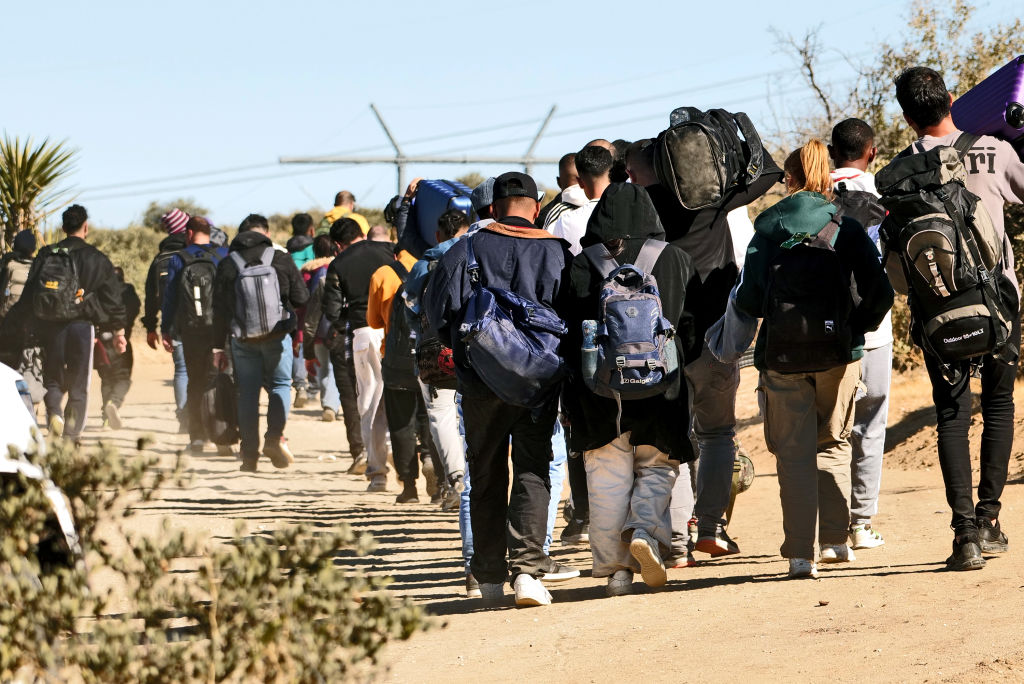A massive riot in Dublin targeting Algerian immigrants. The ascendency of a hard-right political faction in the Netherlands, led by a man who was once thought anathema for his views on Islam and Muslim immigrants. And here in America, major cities fraying under the load of tens of thousands of homeless, jobless migrants.
There are a lot of candidates for the “defining issue of our time” for the West. But for most of this century, the most obvious issue, and the one most obviously beyond the grasp of our political leaders, has been immigration.
Part of the reason immigration policy remains substantially unaddressed in America is the partisan divide on the significance of the issues around it. While 70 percent of Republicans told the Pew Research Center that illegal immigration is “a very big problem,” just a quarter of Democrats said they felt the same way.
Not only do Democrats tend to worry less about the issue, a substantial minority of Democratic voters—which means a lot of high-propensity primary election voters— wants to see increased numbers of immigrants, including the number of asylum seekers allowed to remain in the United States. If addressing illegal immigration is a matter of low salience to their party and would give offense to a vocal minority, Democratic candidates have lots of incentives to steer around the issue.
That’s fine for primary politics, but what about with the broader electorate? Independent voters fall somewhere between Republicans and Democrats on the question of legal immigration. In a poll this year from the Associated Press and the National Opinion Research Center, 65 percent of Republicans wanted fewer immigrants of all kinds in the U.S., while 69 percent of Democrats wanted the status quo or an increase. Independents are more restrictive than Democrats by a 12-point margin but more permissive than Republicans by a 10-point margin. About what you might expect.
But on border security, there was no muddled middle. The same poll found 67 percent of independent voters disapproved of President Biden’s handling of the issue, about the same as independents’ poor rating for Biden on the issue of immigration as a whole. That was Biden’s worst performance with independents on any issue other than the economy.
Republicans, meanwhile, have the opposite problem from Democrats when it comes to immigration. Their primary voters are eager to talk about the subject, including many with an almost religious devotion to the idea of restrictions. But that same intensity makes it politically dangerous to try to actually address the problem in ways that would appeal to the broader electorate, let alone find enough bipartisan support to take action.
The Trump administration made curbing illegal immigration the centerpiece of its policy agenda. Trump not only failed to reduce the number of illegal immigrants in the country, but, according to Census Bureau data, presided over the first increase in the population of illegal immigrants in more than a decade.
Without congressional action based on some policy consensus, no Republican president is going to make a significant change in U.S. immigration policy. And yet, GOP presidential contenders are on the campaign trail selling mass deportations, and not just former President Donald Trump. In a bidding war with Trump, who is looking for yet new ways to maintain his status as the most hard-line hardliner of them all, Republicans continue to move rightward on the issue.
The nature of the Democratic coalition makes it hard for Biden to address the issue at all, while the Republican electorate encourages tough posturing but punishes effective leadership. Democrats don’t want to talk about it. Republicans only want to talk about it.
That leaves independents frustrated with the obvious problems that affect quality of life issues like schools, homelessness, wages, and culture.
About 15 percent of the people in America today are immigrants—something like 50 million people. In that group are approximately 11 million people who came to the United States illegally, about a quarter of the total foreign-born population. Most of the rest are naturalized citizens (about half) or holders of green cards (another quarter or so).
For reference, the immigrant population is a little larger than the Census Bureau’s estimate for America’s black population, which could be a little tricky since some number of African immigrants may consider themselves “black,” a descriptor many native-born Americans of African descent might object to for those who are not the descendants of enslaved Americans.
But we care not for the semantics of ethnic identity here, only a sense of proportions. The immigrant community in the United States is larger than the most influential and politically potent minority group—and essential. Estimates vary, but it’s safe to say that immigrants—both legal and illegal—comprise about a third of the nation’s workforce, more than double their share of the population as a whole.
Mass deportations are not a practical option for those here illegally, but neither is any significant decrease in the pace of legal immigration. In 2021, including temporary workers and students, about 1.5 million foreigners came to reside in the U.S. That almost makes up for America’s flat, low birth rate. Like a lot of wealthy nations, the United States depends on immigration for new workers, new consumers, and new taxpayers to support an aging, shrinking native-born population.
Certainly there’s significant and worthwhile debate over who those immigrants should be: high-skilled vs. low-wage, “huddled masses yearning” vs. self-sufficiency, etc. But the big change in Americans’ perceptions of immigration relates to the question of where.
During the decades prior to 2010 when America’s immigrant population, legal and illegal, was routinely doubling, most of the growth was in a handful of states—California, New York, Illinois, Arizona, Texas, and Florida—and predominantly of Mexican origin. Now, immigration from Mexico is in decline and those states are actually seeing decreased numbers in their foreign-born populations. Meanwhile, migrants are coming from other places and going to other states.
Take Kansas. Census Bureau estimates say there are about 75,000 illegal immigrants in the Jayhawk State, which means that 7 percent of K-12 students there have parents in the country illegally. Or North Carolina, where approximately 325,000 residents are in the United States illegally, 3 percent of the state population. Washington State has one of the fastest growing populations of illegal immigrants, with some 300,000 in 2021, an increase of 50,000 in just five years. In places without the infrastructure or cultural elasticity to easily absorb these populations, problems ensue.
This spreads out the burdens and blessings among states, but it is also making it, as the talking point goes, that “every state is a border state.” And that means that the political dysfunction around the issue is increasingly unsustainable, particularly for Democrats.
The lesson of Europe’s inability to deal with its own migrant problems is that when centrist politicians fail to address the reasonable anxieties of voters, voters will eventually turn to extremists. As David Frum wrote nearly five years ago, “If liberals insist that only fascists will enforce borders, then voters will hire fascists to do the job liberals refuse to do.”
The perverse incentives of our political duopoly have protected Democrats and Republicans from the worst of voter frustrations over the issue of our chaotic, aimless immigration policy—or lack of one at all. But when the stalemate is broken, as seems inevitable, it most certainly will not be in favor of permissive standards and lenient enforcement.
Even if Trump is more talk than action, the American Geert Wilders is out there, just over the horizon. Those who would seek to avoid his arrival would do well to craft a serious policy that balances security and stability with compassion and economic growth.









Please note that we at The Dispatch hold ourselves, our work, and our commenters to a higher standard than other places on the internet. We welcome comments that foster genuine debate or discussion—including comments critical of us or our work—but responses that include ad hominem attacks on fellow Dispatch members or are intended to stoke fear and anger may be moderated.